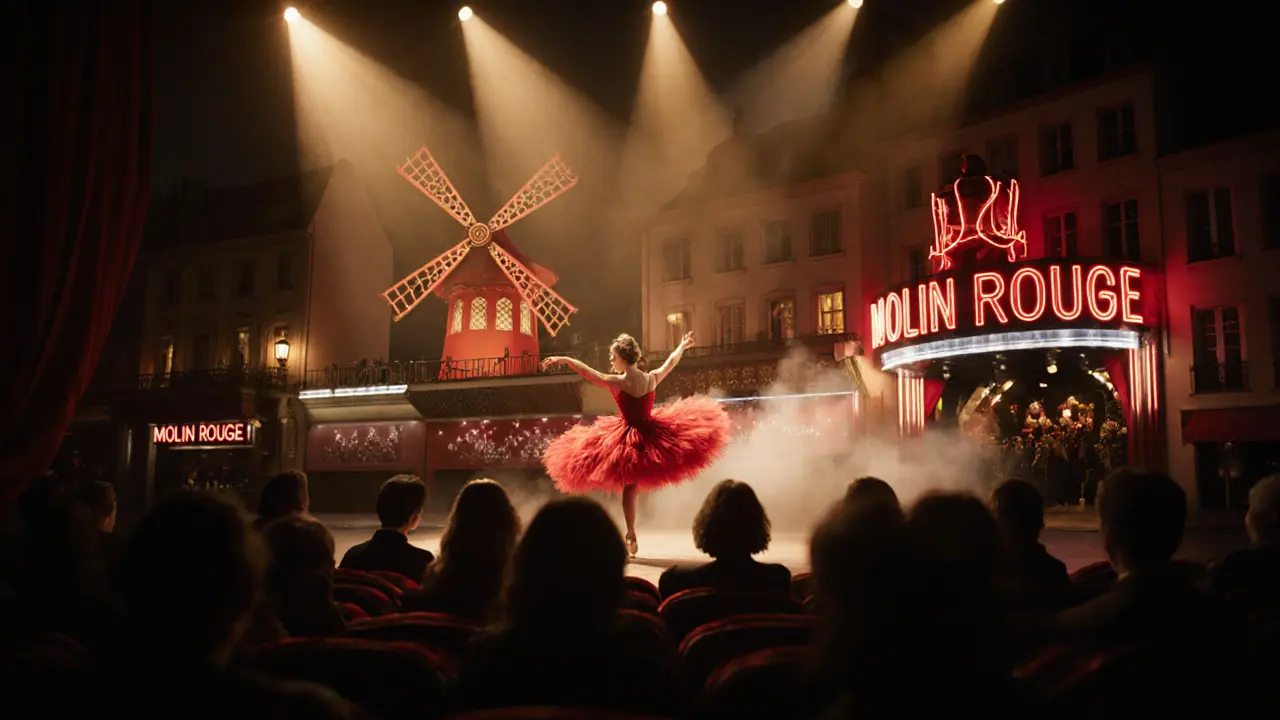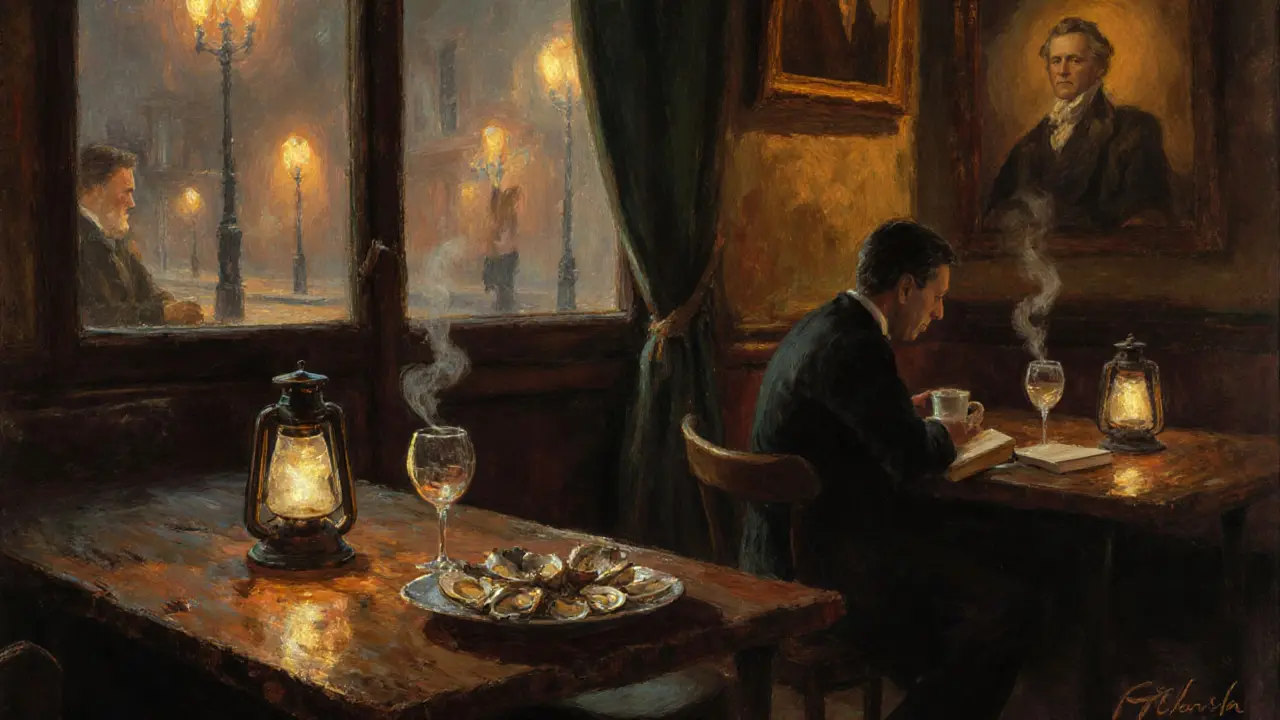The Art of Parisian Nightlife: From Cabarets to Late-Night Cafés
 Nov, 11 2025
Nov, 11 2025
Paris doesn’t sleep. Not really. By 11 p.m., most cities quiet down. In Paris, the real night is just beginning. The city’s nightlife isn’t about loud clubs or neon signs-it’s about atmosphere, history, and the quiet joy of being awake when the rest of the world is asleep. You don’t just go out in Paris. You step into a story.
The Cabaret Legacy: Where Paris First Learned to Stay Up Late
The Moulin Rouge opened in 1889, and with it, Paris gave the world a new kind of evening. Red windmills, feathered fans, and can-can dancers weren’t just entertainment-they were rebellion. Working-class people flocked to Montmartre to see what the elite couldn’t control: raw energy, unfiltered expression, and music that made your feet move even if you didn’t know why.
Today, the Moulin Rouge still runs shows, but it’s no longer the only place that carries that spirit. Le Lido on the Champs-Élysées, Crazy Horse, and even smaller venues like La Cigale keep the tradition alive. These aren’t tourist traps-they’re institutions. The dancers train for years. The costumes cost more than a car. The music? Live, every night, no backing tracks. If you go, sit close. Watch the sweat on the performers’ brows. Feel the heat from the stage. That’s the real cabaret: sweat, sweat, and more sweat.
The Café Culture That Never Closes
Parisian cafés aren’t just places to drink coffee. They’re living rooms with tables. In the 1920s, Hemingway wrote at Les Deux Magots. Sartre debated philosophy at Café de Flore. Today, you’ll find the same energy-but the people are different. Students, artists, expats, and locals all share the same wooden benches, same cracked porcelain cups, same quiet hum of conversation.
Some cafés close at midnight. Others? They stay open until 3 a.m. or later. In Le Marais, La Caféothèque serves single-origin espresso until 3 a.m. on weekends. In Saint-Germain-des-Prés, Le Procope has been serving wine and oysters since 1686. It’s the oldest café in Paris. The walls are covered in portraits of dead writers and actors. You can order a glass of Bordeaux and feel like you’re sitting next to Voltaire.
Don’t expect fast service. Don’t expect loud music. Do expect to linger. That’s the rule. The waiter won’t rush you. They’ll refill your water without asking. They’ll bring you a small plate of olives if you’ve been there too long. That’s Parisian hospitality: patient, quiet, and deeply personal.

The Hidden Bars: Where the Locals Go
Forget the cocktail bars with velvet ropes and Instagram filters. The best bars in Paris are hidden. Behind unmarked doors. Down narrow alleyways. Inside old bookshops. You need a tip. A friend. Or luck.
At Bar Hemingway in the Ritz, you pay €22 for a gin martini-but you’re sipping it in the same room where Ernest Hemingway drank. The bartenders know his favorite order. At Le Comptoir Général, you walk through a jungle of plants and old suitcases to find a bar that feels like a forgotten colonial outpost. The music is African jazz. The cocktails are made with rare African spirits. No one tells you how to get there. You just show up.
Then there’s Le Baron, a secret club above a vintage clothing store in the 11th arrondissement. You need a name on a list. No photos allowed. No phones. Just music, sweat, and strangers who become friends by 2 a.m. It’s not about being famous. It’s about being present.
The Late-Night Eats: When You’re Hungry at 3 a.m.
Parisians don’t eat pizza at 3 a.m. They eat croque-monsieur, grilled cheese with truffle, or crêpes with Nutella and sea salt. The best late-night food spots don’t have menus. They have routines.
At Le Comptoir du Relais in Saint-Germain, the chef still makes his famous duck confit after midnight. You sit at the counter, watch him slice the meat, and he’ll ask, “Un peu de vin?” without looking up. At La Crêperie de Josselin in Montmartre, the line snakes out the door-but it moves fast. The crepes are thin, crisp, and filled with caramelized apples and salted butter. You eat them standing up, paper napkin in hand, trying not to drip.
And then there’s the petit déjeuner du soir-the late-night breakfast. At Le Grenier à Pain in the 10th, you can get a warm baguette with jam and butter at 4 a.m. It’s not fancy. It’s perfect.

The Rules of Parisian Nightlife
There are no rules written down. But everyone knows them.
- Don’t rush. If you’re in a café, stay. If you’re in a bar, drink slowly. Parisians measure time in glasses, not minutes.
- Don’t ask for the “best” bar. Ask where the bartender goes after work. That’s your real answer.
- Don’t take photos inside cabarets. It’s rude. The performers notice. And they remember.
- Don’t say “Paris is overrated.” If you think that, you haven’t been out after midnight.
- Don’t leave before 2 a.m. You haven’t experienced it yet.
The city rewards patience. The music gets better. The conversations deepen. The lights look softer. You start noticing things-the way the Seine reflects the Eiffel Tower at 1 a.m., how the smell of fresh bread mixes with cigarette smoke on the Pont Alexandre III, how silence can be louder than a drumbeat.
When to Go, What to Wear
Parisian nightlife isn’t about flashy outfits. It’s about confidence. A well-fitted coat. A pair of clean shoes. No logos. No sneakers. No baseball caps. Locals dress like they’re going to dinner-even if they’re just grabbing a drink.
Best months? April to June and September to November. Summer is crowded. Winter is cold. But spring and fall? The air is crisp. The streets are quiet. The cafés are warm. And the nightlife feels like it’s yours alone.
Start at 9 p.m. with a drink at a café. Move to a bar by 11. Catch a cabaret show if you can-book ahead. End at 3 a.m. with a crepe and a glass of wine. That’s the rhythm. That’s the art.
Paris doesn’t need you to party. It just wants you to be there. To listen. To sit. To stay awake.
Is Paris nightlife safe at night?
Yes, but like any big city, stay aware. Stick to well-lit areas, especially in Montmartre and the 10th arrondissement after midnight. Avoid unmarked alleys. Most bars and cafés are safe-locals are friendly, and police patrols are common near tourist spots. Never leave your drink unattended. If you’re unsure, ask a bartender or waiter-they’ll guide you.
Do I need to book tickets for cabarets in advance?
Absolutely. Shows at Moulin Rouge, Crazy Horse, and Lido sell out weeks ahead, especially on weekends. Even if you’re staying in Paris for just one night, book at least three days in advance. Some venues offer last-minute standing-room tickets, but those are rare. Don’t rely on showing up. The shows start at 9 p.m. and 11 p.m.-arrive 30 minutes early to get good seats.
Are there any free nightlife options in Paris?
Yes. Many bars in the 11th and 12th arrondissements have live jazz on weeknights with no cover charge. Check out Le Caveau de la Huchette for spontaneous jazz after 10 p.m. Some cafés host poetry readings or acoustic sets on Thursday nights. Walk along the Seine after midnight-street musicians play near Notre-Dame and the Louvre. You don’t need to spend money to feel the pulse of Paris at night.
What’s the best way to get around at night?
The metro runs until about 1:15 a.m. on weekdays and 2:15 a.m. on weekends. After that, take a taxi or ride-share. Uber and Bolt work well. Walking is fine in central areas like the 1st, 6th, and 7th arrondissements-but avoid walking alone in the 18th or 19th after midnight. If you’re tired, hop on a night bus (Noctilien lines). They’re safe, frequent, and cheap.
Can I visit Paris nightlife if I don’t speak French?
Yes, but learning a few phrases helps. “Bonjour,” “Merci,” and “Une bière, s’il vous plaît” go a long way. Most bartenders and waiters speak English, especially in tourist areas. But in hidden bars or local cafés, a simple “Excusez-moi” or “C’est bon” shows respect. Don’t assume everyone will speak English-smile, point, and be patient. Parisians appreciate effort.